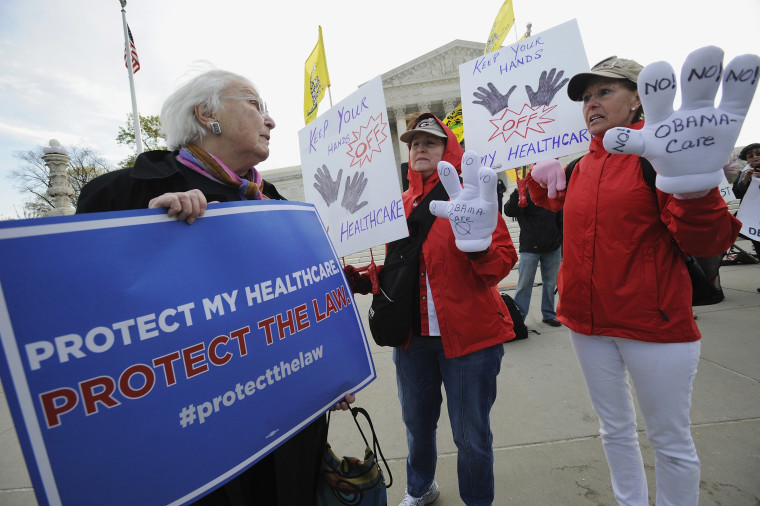Ask a congressional Republican why they're still eager to destroy the Affordable Care Act, and you're likely to hear a response about the economy. "Obamacare," GOP lawmakers like to argue, "is a wet blanket imposed upon job creators."
There is, of course, ample evidence to the contrary. Not only is there literally nothing to suggest the ACA undermines job growth, but the more the law is implemented, the stronger the job market becomes. How do Republicans explain this? Put simply, they can't.
But even putting economic reality aside, there's the small matter of what business leaders themselves have to say on the subject. To be sure, much of Corporate America and its lobbyists are thrilled to have a Republican-controlled Congress, but if GOP leaders assume private-sector leaders are prepared to join an "anti-Obamacare" crusade, Republicans are going to be disappointed.
While many of the more conservative Republicans elected on Tuesday made their opposition to the Affordable Care Act a touchstone of their campaigns, there is much less appetite on the part of business leaders for wholesale changes to the health care law. For one thing, many of the insurance exchanges are finally working well, and businesses have adapted to the new landscape. Even more important, added demand from the newly insured is likely to increase profits in sectors like hospitals, pharmaceuticals and medical devices. "Anything regarding the Affordable Care Act is going to be a stretch," said John K. Lynch, regional chief investment officer for Wells Fargo Private Bank.
This was published the day after the election, before the U.S. Supreme Court announced it might gut the federal law by scrapping insurance subsidies to millions of Americans who enrolled through healthcare.gov.
What's brewing, in other words, is a situation in which the private sector wants the ACA to continue, and big business' ostensibly allies -- Republicans in Congress and perhaps even Republicans on the Supreme Court -- want something altogether different.
Brian Beutler, trying to stem the tide of panic in the wake of the Supreme Court's Friday announcement, noted this morning, "Chief Justice John Roberts himself is a business friendly justice. The Chamber of Commerce basically bats 1.000 with him. An adverse ruling would cause immense harm to powerful corporate interests like private insurance companies, hospitals, and other stakeholders, all of whom oppose the challenge."
The Kaiser Family Foundation's Larry Levitt told Greg Sargent last week that if the high-court majority guts the system over the perception of a drafting error, the insurance market might very well "collapse" in the affected states. "Congress couldn't possibly do nothing at that point," Leavitt said. "There would be tremendous pressure from the insurance industry, and the health care industry generally, to fix this."
Now, my suspicion is that congressional Republicans may not care, even under these circumstances. Their irrational, blinding hatred for "Obamacare" is so all-encompassing, it's more than possible that GOP lawmakers would tolerate mass disruptions and even private-sector losses, just so long as the American health care system was failing.
It probably helps explain why insurance companies' stock prices took a sharp dive on Friday afternoon -- it's easy to imagine Republicans on the Supreme Court acting irresponsibly, and it's even easier to imagine Republicans in Congress shrugging in the face of systemic turmoil.
But let's not get too far ahead of ourselves. The road ahead will take some twists and turns, and this is admittedly speculative. Still, it's interesting to appreciate the fact that when it comes to the future of the ACA, it's not just Republicans against Democrats. It's also Republicans against family advocates, physicians, hospitals, insurance companies, and much of corporate America.
